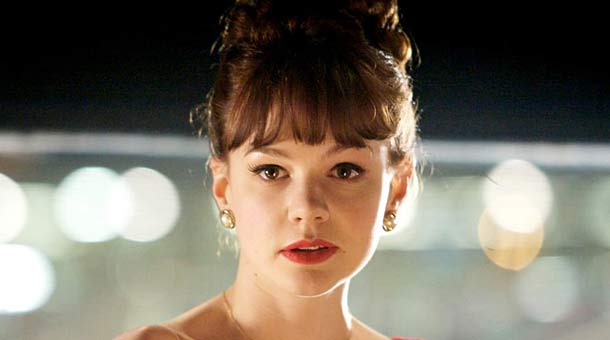Lone Scherfig’s An Education is the 9th of the Best Picture nominees I consider as I gear up for the Academy Awards this Sunday March 7th. Like another nominee, The Blind Side, this film is based on a true story (Nick Hornby’s adaptation of Lynn Barber’s memoir). Like The Blind Side, it features a private school. And like The Blind Side, its leading lady has been nominated for the Best Actress Oscar. Beyond that, the films have little in common. The most obvious difference is that An Education deserves to win the Best Picture Oscar and Carey Mulligan deserves to win the Best Actress Oscar whereas neither The Blind Side nor Sandra Bullock should even have been nominated in these categories.

Unlike any of the other nominees, An Education seems to have gotten by without attracting any reviews which could qualify as a true diss. Part of the reason is that reviewers are universally smitten by Carey Mulligan, whose performance suggests the intelligence of Alexis Bledel and the beauty of Audrey Hepburn. She carries the film and appears in almost every scene. Even those reviews which complain that the film is too light or the resolution too neat nevertheless acknowledge Mulligan’s brilliance. And with her dominant role throughout, that brilliance goes a long way to assuaging those complaints.
An Education tells the story of 16-year-old Jenny, an intelligent middle-class girl bound for Oxford. Her anxiety-ridden father (Alfred Molina) spends a good deal of his time thinking of reasons why Jenny should not do things. For him, his daughter’s education is purely instrumental: it’s value will be measured by the opportunities it yields, and if those opportunities can be had through a husband rather than through a school, so much the better. For her part, Jenny is growing bored of Latin and Shakespeare and the local youth orchestra. So when a man named David (Peter Sarsgaard) who is twice her age offers her a lift home and subsequently asks her to a concert and dinner, she finds the invitations irresistible. David also works his charms on Jenny’s parents, persuading them to grant liberties that Jenny would have thought impossible, including a weekend trip to Paris. Although it is becoming apparent that David funds his cultural escapades by questionable means, Jenny is sufficiently taken by his charms that she accepts a proposal of marriage and quits school, reasoning that she can substitute one form of education for another. After all, David claims to be a graduate from the school of life and he seems to have done well for himself. As for bookish learning, what’s the point? Sounding much like her father, Jenny wonders aloud to the school’s headmistress (Emma Thompson) what it will get her.
As soon as Jenny chooses to quit school, everything unravels. David isn’t at all what he seems and this forces a hard lesson on Jenny. I suppose the reviewers are right when they suggest that the film is predictable, but this is only because the reviewers — and all adults watching the film — already have an education in one form or another complete with its loss of innocence. Nevertheless, as the father of a daughter the same age as Jenny who is waiting for word of acceptance to university, I can understand how a teen aged girl could find herself swept up in the moment, then receive the inevitable fall as something utterly unexpected and bewildering. I suppose naivete looks naive only to the jaded. And we grown-ups are all jaded.
One of the film’s lessons is the importance of forgiveness in education. Another way of stating the matter is that a good education incorporates mistakes since we learn at least as much from our mistakes as from our correct choices. And a good educator is someone who protects us from the full impact of our mistakes so we can go on learning. When Jenny discovers her mistake she returns to her school, apologizing to the headmistress and requesting a spot in the next year’s class so she can finish her A levels. The headmistress refuses, effectively denying a superior student the opportunity to continue formal learning. Jenny seeks out her mentor, Miss Stubbs (Olivia Williams), who takes a different view of things. Miss Stubbs is willing to overlook the rather personal, almost insulting, remarks Jenny has made in suggesting that Miss Stubbs wasn’t really alive. Jenny is forced to re-evaluate her initial assessment of Miss Stubbs. It seems Jenny isn’t smart at all when it comes to reading people. But at least she has that insight. Now her education can begin in earnest.
